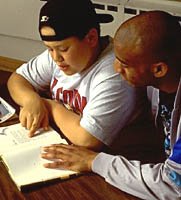 Philip asked, “Do you understand what you are reading there?”
Philip asked, “Do you understand what you are reading there?”“How can I, unless someone guides me?” answered the stranger. “Would you be able to come sit beside me and take a look?”
So Philip sat down next to the stranger, and read a bit. The stranger asked for help interpreting the passage. (It was from the prophet Isaiah.) “Who is this suffering servant who did not lift a finger in his own defense?”
“It was Jesus,” said Philip. And he proceeded to tell the stranger the good news about Jesus, using the stranger’s scripture as a starting point. And what he said made the stranger so happy that he did a cannonball into a nearby pond and shouted out, “Yippee!”
(Acts 8:30-38, paraphrased by me)
Question: Why didn’t the author, Luke, tell us what Philip said when he told the stranger the “good news about Jesus”? Other places in the book of Acts, entire sermons are recorded, so you’d think that if it was important, Luke would have included it here. Did he think the reader would just assume, fill in the blank based on previous writing? The news was certainly exciting enough to cause the Ethiopian eunuch (his friends called him E.E.) to rush pell-mell into the roadside baptismal pool and ask Philip to baptize him. But what did Philip say? Why is Luke so reticent with this assumedly important bit of information?
So my question here is not about what Philip wanted E.E. to know, but what Luke wanted US to know…
Maybe, just maybe, what Philip said was less important than his act of saying it. In other words, maybe what Luke wants us to know has to do more with Philip’s brief relationship with E.E. than with what Philip said to him. We are left on our own to fill in the content of what Philip said, but Luke really wants us to know that Philip said it, at the direction of the Holy Spirit, to a person to whom he would under normal circumstances have never dreamed of speaking.
Relationship is a risk. Risk number one: Philip follows the Spirit’s lead to encounter this stranger (vv. 29-30). Risk number two: the stranger is open to receive Philip into relationship (v. 31). This is why relationship is so hard; it requires both people to be willing to take a risk. If either person had been unwilling to take this risk, there would have been no relationship.
Relationship precludes judgment. Philip did not judge E.E. for being a foreigner, a eunuch (see Deuteronomy 23:1 for a cheery Bible verse – have your V.B.S. kids memorize THAT one this summer!), a courtesan, a person of wealth. E.E. did not judge Philip for being a scruffy traveling preacher, a Galilean, or just plain nosy, coming up all in his business like that. Both characters had reason to judge the other, and both managed to lay these aside so that they could enter into the relationship.
Finally, relationship trumps teaching. What did Philip teach the stranger about Jesus? We may be able to formulate an answer of a sort: Jesus was God’s Messiah who was sent for the forgiveness of sin and the liberation of all creation; he gave himself up to be killed by the authorities of this world but rose again from the dead by the authority of heaven. Or maybe he just told a story, like Jesus did. The point is, we don’t know. Because the point is not to “formulate” anything about Jesus, isn’t it? To formulate the Gospel is to minimize it, to restrict its meaning, to try to conform it to our own terms. Oh, I’m not advocating eradication of all doctrines, creeds, and other teachings of the church, please don’t get me wrong. But when the choice is to nurture a relationship or promulgate a doctrine, the good choice is for the relationship every time.
I guess this little story from Acts for me comes down to this: Too often we Christians get hung up on the doctrine, and forget to be friends.
So, have a nice day!

2 comments:
Thanks again, Andy, for the intriguing and refreshing ideas. I am enjoying our role reversal - for years I tried to give you some idea of how to live a good life; now I am on the receiving end from you. You make me a very proud Mom! cb
AB, that verse is indeed a doozy. I wonder how a sermon on that verse would go.
Post a Comment